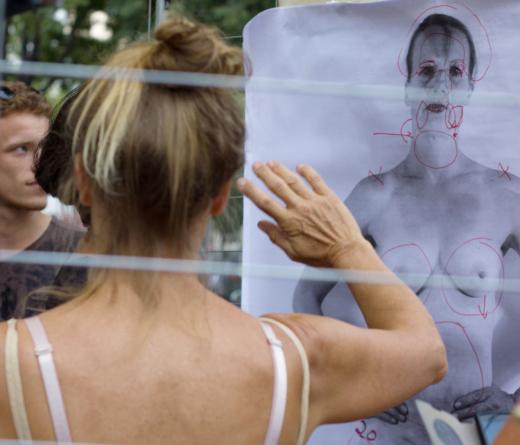No Go
„No Go“ is an English phrase [Slang: orig. astronaut’s jargon] and means „not funktioning properly or not ready to go.“
Using a life-sized image of my naked body, I mark with a red pen the parts of my body which I do not like, f.i. my podgy nose and other parts, which have changed over the years to my discontent and hence I have developed complexes relating to my physical appearance like my flabby belly, my hanging breasts and the general shape of my aging body.
I ask the audience to do the same. Finally, we create a figure on which nearly all body parts are marked as signs of discontent. The audience explains their reasons for their choices and what they plan to do about it.
Then we take a green marker and mark the parts we like best.
Naming the „unwanted“ and sharing the awkwardness by talking about it publicly, makes it much easier to accept the „imperfection“ of one’s own body. Changing the perspective, f.i. if someone presents a body part as unliked and you cannot find any mistake in it, this makes you understand that others might think the same about your unliked body parts.
In this performance we don’t discuss so much about the ideal bodies of young white celebrities which are hyped in the media. This gathering deals more with subjective self-criticism. With whom and to what do we compare ourselves? What is the difference between looking well and feeling well in one’s own body? How and why are they related?
Using a life-sized image of my naked body, I mark with a red pen the parts of my body which I do not like, f.i. my podgy nose and other parts, which have changed over the years to my discontent and hence I have developed complexes relating to my physical appearance like my flabby belly, my hanging breasts and the general shape of my aging body.
I ask the audience to do the same. Finally, we create a figure on which nearly all body parts are marked as signs of discontent. The audience explains their reasons for their choices and what they plan to do about it.
Then we take a green marker and mark the parts we like best.
Naming the „unwanted“ and sharing the awkwardness by talking about it publicly, makes it much easier to accept the „imperfection“ of one’s own body. Changing the perspective, f.i. if someone presents a body part as unliked and you cannot find any mistake in it, this makes you understand that others might think the same about your unliked body parts.
In this performance we don’t discuss so much about the ideal bodies of young white celebrities which are hyped in the media. This gathering deals more with subjective self-criticism. With whom and to what do we compare ourselves? What is the difference between looking well and feeling well in one’s own body? How and why are they related?






















